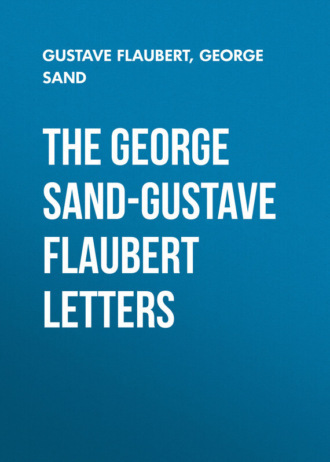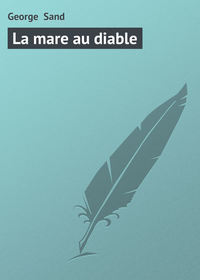 полная версия
полная версияThe George Sand-Gustave Flaubert Letters
Critics have spent much time in discussing the conflict of "romantic" and "realistic" tendencies in Flaubert's works. And it is obviously easy, so far as subject-matter is concerned, to group his books in two divisions: on the one hand, The Temptation of St. Anthony, Salammbo, and two of the Trois Contes; on the other hand, Madame Bovary, L'Education Sentimentale, and the incomplete Bouvard and Pecuchet. We may call the tales in the first group romantic, because the subject-matter is remote in time and place, and because in them Flaubert indulges his passion for splendor – for oriental scenery, for barbaric characters, the pomp of savage war and more savage religion, events strange, terrible, atrocious. We may call the stories in the other group realistic, because the subject-matter is contemporary life in Paris and the provinces, and because in them Flaubert indulges his hatred for mediocrity – for the humdrum existence of the country doctor, the apothecary, the insipid clerk, the vapid sentimental woman, and the charlatans of science. But as a matter of fact, ALL his books are essentially constructed on the same theory: all are just as "realistic" as Flaubert could make them.
Henry James called Madame Bovary a brilliantly successful application of Flaubert's theory; he pronounced L'Education Sentimentale "elaborately and massively dreary"; and he briefly dismissed Salammbo as an accomplished work of erudition. Salammbo is indeed a work of erudition; years were spent in getting up its archaeological details. But Madame Bovary is also a work of erudition, and Bouvard and Pecuchet is a work of enormous erudition; a thousand volumes were read for the notes of the first volume and Flaubert is said to have killed himself by the labor of his unfinished investigations. There is no important distinction to be made between the method or the thoroughness with which he collected his facts in the one case or the other; and the story of the war of the mercenaries against the Carthaginians is evolved with the same alternation of picture and dramatic spectacle and the same hard merciless externality that distinguish the evolution of Emma Bovary's history.
We may go still farther than that towards wiping out the distinction between Flaubert's "romantic" and his "realistic" works; and by the same stroke what is illusory in the pretensions of the realists, namely, their aspiration to an "impersonal art."
If we were seeking to prove that an author can put NOTHING BUT HIMSELF into his art, we should ask for no more impressive illustions than precisely, Madame Bovary and Salammbo. These two masterpieces disclose to reflection, no less patently than the works of George Sand, their purpose and their meaning. And that purpose and meaning are not a whit less personal to Flaubert than the purpose and meaning of Indiana, let us say, are personal to George Sand. The "meaning" of Madame Bovary and Salammbo is, broadly speaking, Flaubert's sense of the significance – or, rather, of the insignificance – of human life; and the "purpose" of the books is to express it. The most lyrical of idealists can do no more to reveal herself.
The demonstration afforded by a comparison of Salammbo and Madame Bovary is particularly striking because the subject-matters are superficially so unlike. But take any characteristic series of pictures or incidents from Salammbo: take the passing of the children through the fire to Moloch, or the description of the leprous Hanno, or the physical surrender of the priestess to her country's enemy, or the following picture of the crucified lion:
"They were marching through a wide defile, hedged in by two chains of reddish hillocks, when a nauseous odor struck their nostrils, and they believed that they saw something extraordinary at the top of a carob tree; a lion's head stood up above the foliage.
"Running towards it, they found a lion attached to a cross by its four limbs, like a criminal; his enormous muzzle hung to his breast, and his forepaws, half concealed beneath the abundance of his mane, were widely spread apart, like a bird's wings in flight; under the tightly drawn skin, his ribs severally protruded and his hind legs were nailed together, but were slightly drawn up; black blood had trickled through the hairs, and collected in stalactites at the end of his tail, which hung straight down the length of the cross. The soldiers crowded around the beast, diverting themselves by calling him 'Consul!' and 'Citizen of Rome!' and threw pebbles into his eyes to scatter the swarming gnats."
And now take any characteristic series of pictures or incidents from Madame Bovary: take Bovary's bungling and gruesome operations on the club-footed ostler's leg, with the entire village clustering agape; take the picture of the eyeless, idiotic beggar on the road to Rouen; or the scene in which Emma offers herself for three thousand francs to Rodolphe; or the following bit, only a bit, from the detailed account of the heroine's last hours, after the arsenical poisoning:
"Emma's head was turned towards her right shoulder, the corner of her mouth, which was open, seemed like a black hole at the lower part of her face; her two thumbs were bent into the palms of her hands; a kind of white dust besprinkled her lashes, and her eyes were beginning to disappear in that viscous pallor that looks like a thin web, as if spiders had spun it over. The sheet sunk in from her breast to her knees, and then rose at the tips of her toes, and it seemed to Charles that infinite masses, an enormous load, were weighing upon her.
"The church clock struck two. They could hear the loud murmur of the river flowing in the darkness at the foot of the terrace. Monsieur Bournisien from time to time blew his nose noisily and Homais' pen was scratching over the paper."
In these two detached pictures – the one from a so-called "romantic," the other from a so-called "realistic" book – one readily observes the likeness in the subjects, which are of a ghastly repulsiveness; the same minuteness of observation – e.g., the lion's hind legs "slightly drawn up," the woman's thumbs "bent into the palms of her hands"; the same careful notation of effect on the several senses; the same rhetorical heightening – e.g., the "stalactites at the end of his tail," the web in the woman's eyes "as if spiders had spun it over"; and finally, that celebrated detachment, that air as of a medical examiner, recording the results of an autopsy. What can we know of such an author? All, or nearly all, that he knew of himself, provided we will searchingly ask ourselves what sort of mind is steadily attracted to the painting of such pictures, to the representation of such incidents, and what sort of mind expresses a lifetime of brooding on the significance of life in two such books as Madame Bovary and Salammbo.
At its first appearance, Madame Bovary was prosecuted, though unsuccessfully, as offensive to public morals. In derision of this famous prosecution, Henry James with studious jauntiness, asserts that in the heat of his first admiration he thought what an excellent moral tract it would make. "It may be very seriously maintained," he continues, "that M. Flaubert's masterpiece is the pearl of 'Sunday reading.'" As a work of fiction and recreation the book lacks, in his opinion, one quite indispensable quality: it lacks charm. Well, there are momentary flashes of beauty and grace, dazzling bits of color, haunting melancholy cadences in every chapter of Flaubert; but a charming book he never wrote. A total impression of charm he never gave – he never could give; because his total impression of life was not charming but atrocious. It is perhaps an accident, as has been suggested, that one can so readily employ Madame Bovary to illustrate that text on the "wages of sin." Emma, to be sure, goes down the easy and alluring path to disgrace and ruin. But that is only an incident in the wider meaning of Flaubert's fiction, a meaning more amply expressed in Salammbo, where not one foolish woman alone but thousands on thousands of men, women, and children, mingled with charging elephants and vipers, flounder and fight in indescribable welters of blood and filth, and go down to rot in a common pit. If I read Flaubert's meaning right, all human history is there; you may show it by painting on broad canvas a Carthaginian battle-scene or by photographing the details of a modern bedroom: a brief brightness, night and the odor of carrion, a crucified lion, a dying woman, the jeering of ribald mercenaries, the cackle of M. Homais. It is all one. If Flaubert deserved prosecution, it was not for making vice attractive, but for expressing with invasive energy that personal and desperately pessimistic conception of life by which he was almost overwhelmed.
That a bad physical regimen, bad habits of work in excessive quantities, and the solitude of his existence were contributory to Flaubert's melancholy, his exacerbated egotism, and his pessimism is sufficiently obvious in the letters. This Norman giant with his aching head buried all day long in his arms, groping in anguish for a phrase, has naturally a kindly disposition towards various individuals of his species – is even capable of great generosity; but as he admits with a truth and pathos, deeply appealing to the maternal sympathies of his correspondent, he has no talent for living. He has never been able, like richer and more resourceful souls, to reconcile being a man with being an author. He has made his choice; he has renounced the cheerful sanities of the world:
"I pass entire weeks without exchanging a word with a human being; and at the end of the week it is not possible for me to recall a single day nor any event whatsoever. I see my mother and my niece on Sundays, and that is all. My only company consists of a band of rats in the garret, which make an infernal racket above my head, when the water does not roar or the wind blow. The nights are black as ink, and a silence surrounds me comparable to that of the desert. Sensitiveness is increased immeasurably in such a setting. I have palpitations of the heart for nothing.
"All that results from our charming profession. That is what it means to torment the soul and the body. But perhaps this torment is our proper lot here below."
To George Sand, who wrote as naturally as she breathed and almost as easily, seclusion and torment were by no means the necessary conditions of literary activity. Enormously productive, with a hundred books to his half-a-dozen, she has never dedicated and consecrated herself to her profession but has lived heartily and a bit recklessly from day to day, spending herself in many directions freely, gaily, extravagantly. Now that she has definitely said farewell to her youth, she finds that she is twenty years younger; and now that she is, in a sense, dissipating her personality and living in the lives of others, she finds that she is happier than ever before. "It can't be imperative to work so painfully" – such is the burden of her earlier counsels to Flaubert; "spare yourself a little, take some exercise, relax the tendons of your mind, indulge a little the physical man. Live a little as I do; and you will take your fatigues and illnesses and occasional dolours and dumps as incidents of the day's work and not magnify them into the mountainous overshadowing calamities from which you deduce your philosophy of universal misery." No advice could have been more wholesome or more timely. And with what pictures of her own busy felicity she reenforces her advice! I shall produce three of them here in order to emphasize that precious thing which George Sand loved to impart, and which she had the gift of imparting, namely, joy, the spontaneous joyousness of her own nature. The first passage is from a letter of June 14, 1867:
"I am a little remorseful to take whole days from your work, I who am never bored with loafing, and whom you could leave for whole hours under a tree, or before two lighted logs, with the assurance that I should find there something interesting. I know so well how to live OUTSIDE OF MYSELF. It hasn't always been like that. I also was young and subject to indignations. It is over! Since I have dipped into real nature, I have found there an order, a system, a calmness of cycles which is lacking in mankind, but which man can, up to a certain point, assimilate when he is not too directly at odds with the difficulties of his own life. When these difficulties return, he must endeavor to avoid them; but if he has drunk the cup of the eternally true, he does not get too excited for or against the ephemeral and relative truth."
The second passage is of June 21:
"I love everything that makes up a milieu, the rolling of the carriages and the noise of the workmen in Paris, the cries of a thousand birds in the country, the movement of the ships on the waters. I love also absolute, profound silence, and, in short, I love everything that is around me, no matter where I am."
The last passage gives a glimpse of the seventeenth of January, 1869, a typical day in Nohant:
"The individual named George Sand is well: he is enjoying the marvellous winter which reigns in Berry, gathering flowers, noting interesting botanical anomalies, making dresses and mantles for his daughter-in-law, costumes for the marionettes, cutting out scenery, dressing dolls, reading music, but above all spending hours with the little Aurore, who is a marvellous child. There is not a more tranquil or a happier individual in his domestic life than this old troubadour retired from business, who sings from time to time his little song to the moon, without caring much whether he sings well or ill, provided he sings the motif that runs in his head, and who, the rest of the time, idles deliciously… This pale character has the great pleasure of loving you with all his heart, and of not passing a day without thinking of the other old troubadour, confined in his solitude of a frenzied artist, disdainful of all the pleasures of the world."
Flaubert did "exercise" a little – once or twice – in compliance with the injunctions of his "dear master"; but he rather resented the implication that his pessimism was personal, that it had any particular connection with his peculiar temperament or habits. He wished to think of himself as a stoic, quite indifferent about his "carcase." His briefer black moods he might acknowledge had transitory causes. But his general and abiding conceptions of humanity were the result of dispassionate reflections. "You think," he cries in half-sportive pique, "that because I pass my life trying to make harmonious phrases, in avoiding assonances, that I too have not my little judgments on the things of this world? Alas! Yes! and moreover I shall burst, enraged at not expressing them." And later: "Yes, I am susceptible to disinterested angers, and I love you all the more for loving me for that. Stupidity and injustice make me roar, – and I howl in my corner against a lot of things 'that do not concern me.'" "On the day that I am no longer in a rage, I shall fall flat as the marionette from which one withdraws the support of the stick."
So far as Flaubert's pessimism has an intellectual basis, it rests upon his researches in human history. For Salammbo and The Temptation of St. Anthony he ransacked ancient literature, devoured religions and mythologies, and saturated himself in the works of the Church Fathers. In order to get up the background of his Education Sentimentale he studied the Revolution of 1848 and its roots in the Revolution of 1789. He found, shall we say? what he was looking for-inexhaustible proofs of the cruelty and stupidity of men. After "gulping" down the six volumes of Buchez and Roux, he declares: "The clearest thing I got out of them is an immense disgust for the French… Not a liberal idea which has not been unpopular, not a just thing that has not caused scandal, not a great man who has not been mobbed or knifed. 'The history of the human mind is the history of human folly,' as says M. Voltaire. … Neo-Catholicism on the one hand, and Socialism on the other, have stultified France." In another letter of the same Period and similar provocation: "However much you fatten human cattle, giving them straw as high as their bellies, and even gilding their stable, they will remain brutes, no matter what one says. All the advance that one can hope for, is to make the brute a little less wicked. But as for elevating the ideas of the mass, giving it a larger and therefore a less human conception of God, I have my doubts."
In addition to the charges of violence and cruelty, which he brought against all antiquity as well as against modern times, much in the fashion of Swift or the older Mark Twain, Flaubert nursed four grave causes of indignation, made four major charges of folly against modern "Christian" civilization. In religion, we have substituted for Justice the doctrine of Grace. In our sociological considerations we act no longer with discrimination but upon a principle of universal sympathy. In the field of art and literature we have abandoned criticism and research for the Beautiful in favor of universal puffery. In politics we have nullified intelligence and renounced leadership to embrace universal suffrage, which is the last disgrace of the human spirit.
It must be acknowledged that Flaubert's arraignment of modern society possesses the characteristics commended by the late Barett Wendell: it is marked in a high degree by "unity, mass, and coherence." It must be admitted also that George Sand possessed in a high degree the Pauline virtue of being "not easily provoked," or she never could have endured so patiently, so sweetly, Flaubert's reiterated and increasingly ferocious assaults upon her own master passion, her ruling principle. George Sand was one whose entire life signally attested the power of a "saving grace," resident in the creative and recuperative energies of nature, resident in the magical, the miracle-working, powers of the human heart, the powers of love and sympathy. She was a modern spiritual adventurer who had escaped unscathed from all the anathemas of the old theology; and she abounded, like St. Francis, in her sense of the new dispensation and in her benedictive exuberance towards all the creatures of God, including not merely sun, moon, and stars and her sister the lamb but also her brother the wolf. On this principle she loves Flaubert! – and archly asserts her arch-heresy in his teeth. He complains that her fundamental defect is that she doesn't know how to "hate." She replies, with a point that seems never really to have pierced his thick casing of masculine egotism:
"Artists are spoiled children and the best are great egotists. You say that I love them too well; I like them as I like the woods and the fields, everything, everyone that I know a little and that I study continually. I make my life in the midst of all that, and as I like my life, I like all that nourishes it and renews it. They do me a lot of ill turns which I see, but which I no longer feel. I know that there are thorns in the hedges, but that does not prevent me from putting out my hands and finding flowers there. If all are not beautiful, all are interesting. The day you took me to the Abbey of Saint-Georges I found the scrofularia borealis, a very rare plant in France. I was enchanted; there was much – in the neighborhood where I gathered it. Such is life!
"And if one does not take life like that, one cannot take it in any way, and then how can one endure it? I find it amusing and interesting, and since I accept EVERYTHING, I am so much happier and more enthusiastic when I meet the beautiful and the good. If I did not have a great knowledge of the species, I should not have quickly understood you, or known you or loved you."
Two years later the principles and tempers of both these philosophers were put to their severest trial. In 1870, George Sand had opportunity to apply her doctrine of universal acceptance to the Prussians in Paris. Flaubert had opportunity to welcome scientific organization in the Prussian occupation of his own home at Croisset. The first reaction of both was a quite simple consternation and rage, in which Flaubert cries, "The hopeless barbarism of humanity fills me with a black melancholy," and George Sand, for the moment assenting, rejoins: "Men are ferocious and conceited brutes." As the war thickens around him and the wakened militancy of his compatriots presses him hard, Flaubert becomes more and more depressed; he forebodes a general collapse of civilization – before the century passes, a conflict of races, "in which several millions of men kill one another in one engagement." With the curiously vengeful satisfaction which mortals take in their own misery when it offers occasion to cry "I told you so," he exclaims: "Behold then, the NATURAL MAN. Make theories now! Boast the progress, the enlightenment and the good sense of the masses, and the gentleness of the French people! I assure you that anyone here who ventured to preach peace would get himself murdered."
George Sand in her fields at Nohant – not "above" but a little aside from the conflict – turns instinctively to her peasant doggedly, placidly, sticking at his plow; turns to her peasant with a kind of intuition that he is a symbol of faith, that he holds the keys to a consolation, which the rest of us blindly grope for: "He is imbecile, people say; no, he is a child in prosperity, a man in disaster, more of a man than we who complain; he says nothing, and while people are killing, he is sowing, repairing continually on one side what they are destroying on the other." Flaubert, who thinks that he has no "illusions" about peasants or the "average man," brings forward his own specific of a quite different nature: "Do you think that if France, instead of being governed on the whole by the crowd, were in the power of the mandarins, we should be where we are now? If, instead of having wished to enlighten the lower classes, we had busied ourselves with instructing the higher, we should not have seen M. de Keratry proposing the pillage of the duchy of Baden."
In the great war of our own time with the same foes, our professional advocates of "preparedness," our cheerful chemists, our scientific "intellectuals" – all our materialistic thinkers hard- shell and soft-shell, – took the position of Flaubert, just presented; reproached us bitterly for our slack, sentimental pacificism; and urged us with all speed to emulate the scientific spirit of our enemy. There is nothing more instructive in this correspondence than to observe how this last fond illusion falls away from Flaubert under the impact of an experience which demonstrated to his tortured senses the truth of the old Rabelaisian utterance, that "science without conscience is the ruin of the soul."
"What use, pray," he cries in the last disillusion, "is science, since this people abounding in scholars commits abominations worthy of the Huns and worse than theirs, because they are systematic, cold-blooded, voluntary, and have for an excuse, neither passion nor hunger?" And a few months later, he is still in mad anguish of desolation:
"I had some illusions! What barbarity! What a slump! I am wrathful at my contemporaries for having given me the feelings of a brute of the twelfth century! I'm stifling in gall! These officers who break mirrors with white gloves on, who know Sanskrit, and who fling themselves on the champagne; who steal your watch and then send you their visiting card, this war for money, these civilized savages give me more horror than cannibals. And all the world is going to imitate them, is going to be a soldier! Russia has now four millions of them. All Europe will wear a uniform. If we take our revenge, it will be ferocious in the last degree; and, mark my word, we are going to think only of that, of avenging ourselves on Germany."
Under the imminence of the siege of Paris, Flaubert had drilled men, with an out-flashing of the savage fighting spirit of his ancestors, of which he was more than half ashamed. But at heart he is more dismayed, more demoralized, more thoroughly prostrated than George Sand. He has not fortitude actually to face the degree of depravity which he has always imputed to the human race, the baseness with which his imagination has long been easily and cynically familiar. As if his pessimism had been only a literary pigment, a resource of the studio, he shudders to find Paris painted in his own ebony colors, and his own purely "artistic" hatred of the bourgeois, translated into a principle of action, expressing itself in the horrors of the Commune, with half the population trying to strangle the other half. Hatred, after all, contempt and hatred, are not quite the most felicitous watchwords for the use of human society. Like one whose cruel jest has been taken more seriously than he had intended and has been turned upon his own head, Flaubert considers flight: "I cherish the following dream: of going to live in the sun in a tranquil country." As a substitute for a physical retreat, he buries himself in a study of Buddhism, and so gradually returns to the pride of his intellectual isolation. As the tumult in his senses subsides, he even ventures to offer to George Sand the anodyne of his old philosophical despair: "Why are you so sad? Humanity offers nothing new. Its irremediable misery has filled me with sadness ever since my youth. And in addition I now have no disillusions. I believe that the crowd, the common herd will always be hateful. The only important thing is a little group of minds always the same – which passes the torch from one to another."









